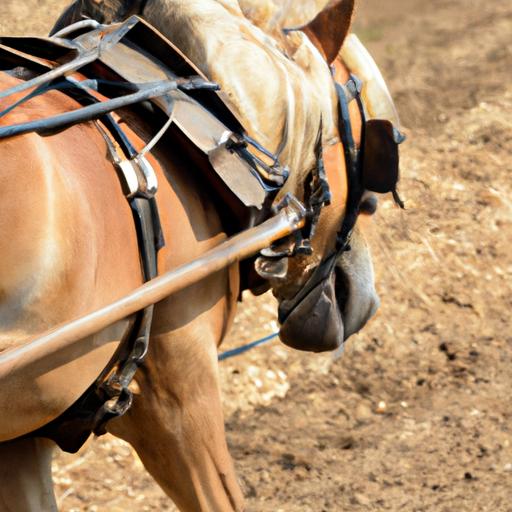Discover the intriguing debate: are horses considered livestock? Uncover their historical significance, legal definitions, and ongoing classification debate.
When it comes to categorizing animals, there’s often a gray area that raises intriguing questions. One such query that frequently arises is whether horses should be considered livestock or companion animals. In this article, we’ll delve into this debate and explore the factors that contribute to the classification of horses.
Introduction

Livestock, as a term, generally refers to animals raised for economic purposes, such as food production, labor, or other agricultural uses. Understanding the definition of livestock is crucial in determining the status of horses in this context. However, the classification of horses goes beyond mere semantics. It holds significance in legal, ethical, and practical aspects, making it an intriguing topic worth exploring.
To grasp the classification of horses, we must first understand what livestock entails. Livestock refers to animals raised on farms, ranches, or other agricultural settings, primarily for economic gains. These animals are often bred, managed, and utilized for various purposes, including meat, milk, wool, and labor. However, horses bring about a unique perspective to this classification due to their historical significance and multifaceted roles in society.
The importance of understanding horse classification extends beyond semantic debates. It affects the regulations, rights, and responsibilities associated with these majestic creatures. Whether horses are classified as livestock or companion animals influences their treatment, legal protections, and even their role in industries like agriculture and sports.
As we delve further into this topic, we’ll explore the arguments and perspectives surrounding the classification of horses as livestock or companion animals. By examining the historical context, legal definitions, economic implications, and ethical considerations, we hope to shed light on this intriguing debate. So, let’s saddle up and embark on this captivating journey to determine whether horses are truly considered livestock or companions.
Understanding the Classification of Livestock

As we delve deeper into the debate surrounding the classification of horses, it’s essential to grasp the broader understanding of livestock classification. By exploring the definition of livestock, different types of livestock, and the various factors that influence their classification, we can gain valuable insights into the categorization of animals.
Definition of Livestock
Livestock encompasses a wide range of animals that are raised for economic purposes. These animals are typically managed and bred on farms, ranches, or other agricultural settings. The term livestock commonly includes species such as cattle, pigs, sheep, goats, and poultry. These animals serve diverse functions, including meat production, dairy farming, wool production, and more.
Different Types of Livestock
Livestock can be further divided into different categories based on their specific purposes and characteristics. For instance, animals raised primarily for meat production are commonly referred to as “meat animals.” This group includes cattle, pigs, sheep, and goats, among others. On the other hand, animals raised primarily for milk production are known as “dairy animals,” such as cows and goats.
Additionally, there are animals classified as “fiber animals,” which are primarily raised for their wool or fur. This category includes sheep, alpacas, and angora goats. Furthermore, there are “poultry animals,” which consist of chickens, ducks, turkeys, and other birds raised for their meat or eggs. Each type of livestock serves specific economic purposes and requires distinct management practices.
Factors Influencing Livestock Classification
Several factors contribute to the classification of animals as livestock. These factors may vary across different regions and jurisdictions, but some common considerations include:
- Economic Importance: The economic value and utility of animals play a significant role in their classification. Animals that contribute substantially to the agricultural industry and provide essential resources are more likely to be categorized as livestock.
- Cultural and Historical Significance: The cultural and historical context surrounding certain animals can influence their classification. Animals that have played a significant role in human societies throughout history may be more likely to be considered livestock.
- Legal and Regulatory Frameworks: The legal definitions and regulations set by governing bodies play a crucial role in determining the status of animals. Laws regarding animal welfare, food safety, and agricultural practices can impact the classification of animals as livestock.
By understanding the definition of livestock, the different types of livestock, and the factors that influence their classification, we can lay the foundation for comprehending the classification of horses. In the following sections, we will explore the specific arguments and perspectives surrounding the classification of horses as livestock or companion animals.
Horses as Livestock: Arguments and Perspectives

When considering the classification of horses, it’s important to explore the arguments and perspectives that support their categorization as livestock. Let’s delve into some key points that highlight horses’ role in the realm of livestock.
A. Horses for Meat Production
One argument in favor of classifying horses as livestock revolves around their potential for meat production. While it may be a sensitive topic for some, the reality is that horses have been consumed as meat in various cultures throughout history. Proponents argue that if horses are bred and raised specifically for meat, they should be considered livestock just like other animals raised for food.
B. Horse Farming and Breeding
Horse farming and breeding also contribute to the argument of horses being categorized as livestock. Breeding programs aim to enhance specific traits, such as speed or strength, to improve the quality of working horses or those used in various industries. These practices align with the principles of livestock farming, where selective breeding is common to improve desired characteristics in animals.
C. Horses in the Agriculture Industry
Horses have played a significant role in agriculture for centuries. They have been used for plowing fields, pulling carts, and performing various tasks essential for farming practices. Their contribution to the agriculture industry aligns with the concept of livestock, as their labor and productivity contribute to economic gains and sustenance.
D. Economic Implications of Horse Classification
The classification of horses as livestock has economic implications. By considering horses as livestock, they become eligible for agricultural subsidies, insurance coverage, and other benefits that support the industry. This recognition can provide financial stability to horse breeders, farmers, and other stakeholders, ensuring the sustainability of their operations.
These arguments shed light on the perspective that horses should be considered livestock due to their potential for meat production, their role in horse farming and breeding, their contribution to the agriculture industry, and the economic implications of their classification. However, it’s essential to explore the contrasting viewpoint that perceives horses as companion animals.
Horses as Companion Animals: Arguments and Perspectives
When discussing the classification of horses, it’s essential to consider the perspective that views these majestic creatures as companion animals. While horses have been historically recognized for their utility in various industries, there is a profound bond that develops between humans and horses, elevating their status beyond mere livestock.
A. Horses as pets and companions
For many individuals, horses are not just animals; they become cherished pets and beloved companions. The unique bond formed between humans and horses can be incredibly fulfilling and rewarding. Horses offer companionship, loyalty, and emotional support, much like traditional pets such as dogs or cats. Countless horse owners consider their equine friends as part of their families, providing care, attention, and love.
B. Equestrian sports and recreational activities
Another aspect that highlights the companion nature of horses is their role in equestrian sports and recreational activities. From dressage to show jumping, horse racing to trail riding, these activities emphasize the partnership and cooperation between humans and horses. The artistry and skill displayed in these sports require a deep understanding and connection between rider and horse, showcasing the unique companionship that exists between them.
C. Emotional bond between humans and horses
The emotional bond between humans and horses is undeniable. Spending time with horses can be therapeutic and offer a sense of peace and tranquility. Many individuals turn to equine-assisted therapy to address mental health issues, develop confidence, and improve overall well-being. Horses provide a safe space for individuals to express their emotions, build trust, and develop valuable life skills.
D. Ethical considerations of horse classification
Consideration of the ethical implications is vital when determining the classification of horses. Treating horses solely as livestock may disregard their emotional and social needs, potentially compromising their welfare. Recognizing horses as companion animals acknowledges their individuality, allowing for better standards of care, protection, and consideration of their well-being.
In conclusion, viewing horses as companion animals goes beyond their utilitarian value. The bond formed between humans and horses, the involvement in equestrian sports and recreational activities, and the ethical considerations all contribute to their classification as companions. While horses may have historical significance and serve various purposes, recognizing their role as companions is crucial for their overall welfare and the preservation of the profound connection between humans and these magnificent creatures.
Conclusion
In conclusion, the classification of horses as livestock or companion animals is a complex and multifaceted issue. The historical significance of horses as working animals cannot be denied, as they have played vital roles in agriculture, transportation, and various industries throughout human civilization. However, the evolving perspectives on animal welfare and the emotional bond between humans and horses have sparked a debate on their classification.
Legal definitions and regulations also come into play when determining the status of horses. Different countries and jurisdictions may have varying laws and regulations regarding the treatment and use of horses. This further adds to the complexity of the debate and highlights the need for a comprehensive understanding of horse classification.
The ongoing debate on whether horses should be classified as livestock or companion animals reflects the changing values and attitudes towards animal welfare. While some argue for horses to be recognized primarily as livestock, emphasizing their economic value and potential contributions to industries such as meat production, farming, and racing, others advocate for their classification as companion animals, highlighting the emotional bond, recreational activities, and the ethical considerations surrounding their treatment.
Moving forward, it is essential to recognize the importance of this debate and its potential implications. Understanding whether horses should be classified as livestock or companion animals can influence legislation, regulations, and the overall treatment of these magnificent creatures. As the equestrian community, policymakers, and society at large continue to grapple with this issue, it is crucial to ensure the well-being and protection of horses, regardless of their classification.
At horsemasterypro.com, we strive to provide comprehensive information and insights into the world of horses. Whether they are considered livestock or companions, we believe in promoting responsible horse ownership, fostering a deep understanding of their needs, and advocating for their welfare. Join us in this journey of horsemanship and discover the beauty and majesty of these remarkable animals.
Remember, whether horses are classified as livestock or companion animals, their significance in our lives is undeniable. Let’s continue to appreciate and respect these incredible creatures, ensuring their well-being and preserving their place in our hearts and society.


